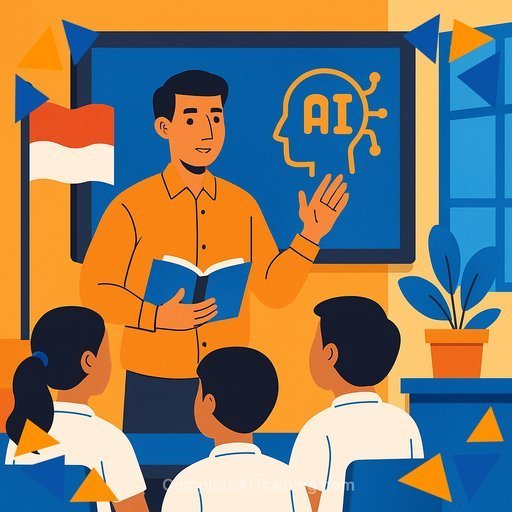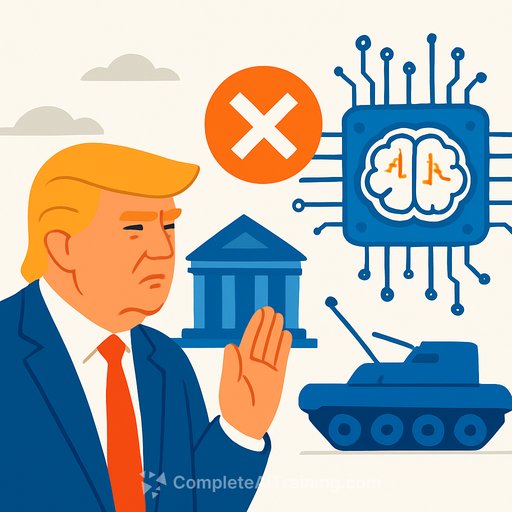AI Qualification Planned for Schools Faces a Simple Constraint: Teacher Supply
The Government is exploring a new level 3 qualification in data science and AI as part of a wider curriculum refresh. AI literacy will be taught across the curriculum, and the current computer science GCSE will be replaced with a broader computing GCSE.
Experts welcome the direction. The sticking point is predictable: not enough specialist teachers to deliver it at scale.
What's Changing
- Potential new level 3 qualification in data science and AI.
- AI literacy embedded across the refreshed curriculum.
- Computer science GCSE replaced by a broader computing GCSE.
- Financial education strengthened; citizenship made compulsory in key stages 1 and 2.
- Cut to GCSE exam time by 2.5-3 hours on average; aim to reduce assessment fatigue while keeping standards.
- Scrapping of EBacc performance measure; statutory entitlement to triple science at GCSE.
- Year 8 diagnostics in maths and English; overhaul of the key stage 2 grammar, punctuation and spelling test.
The Capacity Problem
Recruitment into computer science is already behind target. In 2024/25, only 37% of the Government's target for computer science trainee teachers was met. Forecasts suggest improvement to 79% in 2025/26, but the gap is still significant.
"If the government wants to introduce a dedicated qualification in AI, it will need to ensure it has a teaching workforce that is skilled and confident to teach that content," said Jon Andrews of the Education Policy Institute. Myles McGinley at Cambridge OCR flagged the same issue: teacher and examiner capacity will be the pressure point.
AQA's Colin Hughes expects any AI/data science qualification to include a strong digital component, noting that parts of computer science are already assessed digitally. He also urged more ambition from government on digital assessment to match the content shift.
The Department for Education points to progress: 2,300 more teachers in secondary and special schools, and a 25% increase in acceptances to STEM teacher training this autumn. That's positive, but unlikely to fully cover specialist AI delivery in the near term.
Financial Education Starts Earlier
Citizenship will be mandatory in primary schools, and concepts like calculating interest will begin in maths. Martin Lewis welcomed the move, while stressing it must come with teacher training and resources.
The review panel was clear on breadth: "It is clear that the EBacc performance measures have to some degree unnecessarily constrained students' choices," limiting access to arts and vocational routes.
What Government Teams Should Do Now
- Model workforce need: Estimate specialist staffing for AI/data science at level 3 and for the new computing GCSE. Include examiner capacity.
- Fund targeted CPD: Fast-track upskilling for existing computing, maths, and science teachers; align with clear standards and micro-credentials.
- Set up pilots: Trial the qualification with a small network of schools and colleges; co-design with exam boards and employers.
- Plan digital assessment readiness: Audit infrastructure (devices, bandwidth, invigilation models). Coordinate with Ofqual on reliability and security.
- Secure industry partnerships: Bring in guest educators, mentors, and live datasets. Prioritise safeguarding and data-sharing agreements.
- Address equity: Fund kit, software, and teacher time in areas with low access to specialist staff to avoid postcode gaps.
- Commission evaluation: Evidence for AI tools in teaching is limited. Build trials and independent evaluation into the rollout.
- Communicate clearly: Give heads and MATs a simple timeline, funding routes, and the expected teacher standards for AI/data science.
Exam Load and Standards
The review recommends cutting exam volume at key stage 4 by around 10%. Curriculum review leader Professor Becky Francis noted the UK is an outlier on the amount of testing at age 16, with only Singapore close. The DfE says it will work with Ofqual and boards to reduce time without weakening validity.
Some subjects can cut more than 10% without risk; others (like maths and physics) may require careful sampling to keep rigour and coverage intact.
Timeline and Dependencies
- Curriculum review launched July 2024; 7,000+ public responses considered.
- Revised national curriculum targeted for spring 2027; first teaching from September 2028.
- Dependencies: teacher recruitment cycles, CPD funding, exam board development, digital assessment readiness, and school timetabling.
Risks to Watch
- Teacher supply: Without rapid CPD and incentives, the AI qualification will be constrained to a minority of institutions.
- Uneven access: Schools without specialist staff or infrastructure fall behind, widening attainment gaps.
- Assessment readiness: Digital assessment needs robust infrastructure, accessibility provisions, and contingency plans.
- Evidence gap: The effectiveness of AI tools in classrooms remains mixed; procurement should follow evidence, not hype.
- Primary delivery load: Making citizenship compulsory requires materials, planning time, and clear teacher guidance.
Practical Resources
- Department for Education updates and policy guidance.
- AI courses by job for short-term CPD options while national training pathways are set up.
Bottom Line
The policy intent is strong: build AI literacy, create a clear post-16 route in data science and AI, reduce assessment drag, and broaden student choice. Delivery hinges on teachers. Fund CPD, run focused pilots, and get digital assessment ready. That's how this moves from plan to practice without lowering standards or access.
Your membership also unlocks:





